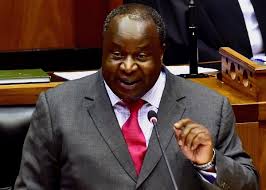
Faizel Patel – 24/02/2021
Finance Minister Tito Mboweni has tabled a two trillion rand budget that he says will focus on COVID-19 vaccine rollout and efficient spending.
Mboweni presented his budget in Parliament on Wednesday.
The finance minister says he wants to give South Africans hope and leave the economy in a better shape than it was.
“Under the leadership of our President, we have crafted a Fiscal Framework that extends support to the economy and public health services in the short-term, while ensuring the sustainability of our public finances in the medium term. This is our first reason for hope.”
“The fiscal framework we table today entails the following: Main budget revenue is projected to be R1.35 trillion, or 25.3 per cent as a share of Gross Domestic Product (GDP) in 2021/22. This rises to R1.52 trillion in the outer year (2023/24) of the Medium-Term Expenditure Framework (MTEF).”
“At the same time, non-interest spending will remain steady at approximately R1.56 trillion over the next three years but will decline as a share of GDP from 29.2 per cent in 2021/22 to 26.2 per cent of GDP in 2023/24”
Mboweni has allocated R10 billion for the purchase and delivery of vaccines over the next two years.
The finance minister says there will also be a shortfall in revenue collection.
“We now expect to collect R1.21 trillion in taxes during 2020/21, which is about R213 billion less than our 2020 Budget expectations. This is the largest tax shortfall on record.”
Mboweni also announced fuel levies will be increase by 27 cents per litre, comprising 15 cents per litre for the general fuel levy, 11 cents per litre for the Road Accident Fund levy and 1 cent per litre for the carbon fuel levy.
The finance minister has also increased the sin taxes.
“An 8% increase in the excise duties on alcohol and tobacco products.”
The finance minister says the country’s borrowing requirement will remain well above R500 billion in each year of the medium term despite the modest improvements in the country’s fiscal position.
“Consequently, gross loan debt will increase from R3.95 trillion in the current fiscal year to R5.2 trillion in 2023/24. We owe a lot of people a lot of money. These include foreign investors, pension funds, local and foreign banks, unit trusts, financial corporations, insurance companies, the Public Investment Corporation and ordinary South African bondholders.”
Mboweni says the personal income tax brackets will be increased by 5 per cent, which is more than inflation.
“This will provide R2.2 billion in tax relief. Most of that relief will reduce the tax burden on the lower and middle-income households. This means that if you are earning above the new tax-free threshold of R87 300, you will have at least an extra R756 in your pocket after 1 March 2021.”
Social Development
Provinces will receive R3.5 billion from the Department of Social Development to improve access to early childhood development services.
R6.3 billion is allocated to extend the special Covid-19 social relief of distress grant until the end of April 2021. In addition, R678.3 million is earmarked for provincial departments of social development and basic education to continue rolling out free sanitary products for learners from low-income households.
Regular social assistance grants are adjusted as follows:
- A R30 increase for the old age, disability and care dependency grants to R1890.
- A R30 increase in the war veterans grant to R1910.
- A R10 increase in the child support grant to R460.
- A R10 increase for the foster care grant to R1050.Government remains committed to ensuring that deserving students are supported through higher education. The National Treasury is working with the Department of Higher Education and Training to work on policy and funding options that will be detailed in the MTBPS.







0 Comments